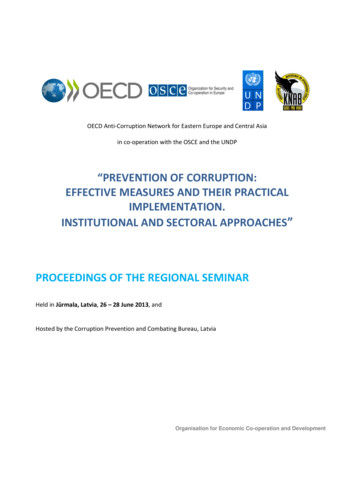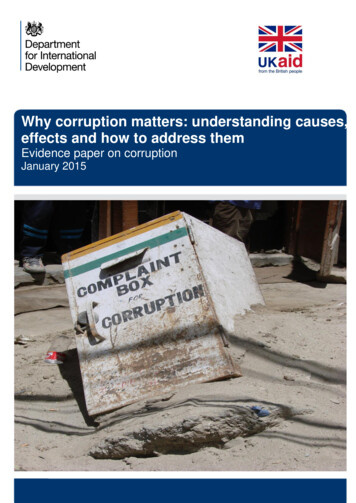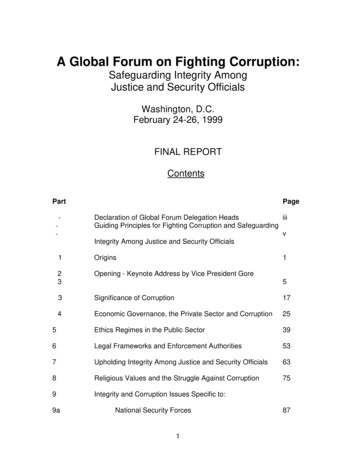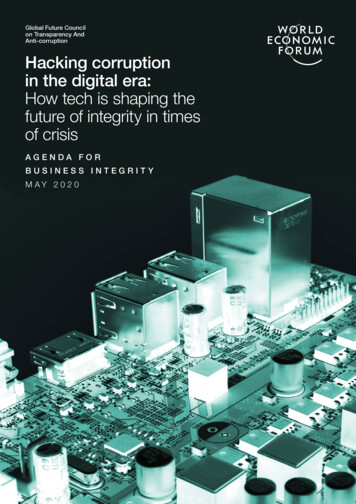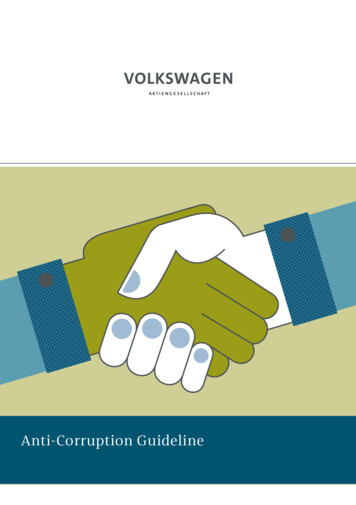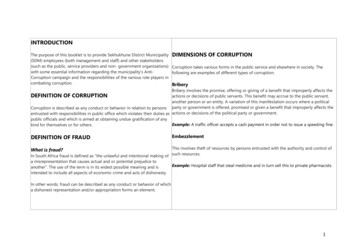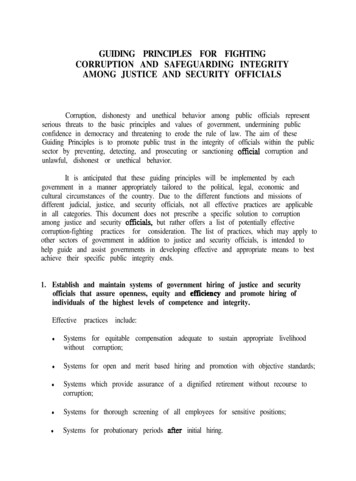
Transcription
GUIDING PRINCIPLES FOR FIGHTINGCORRUPTION AND SAFEGUARDING INTEGRITYAMONG JUSTICE AND SECURITY OFFICIALSCorruption, dishonesty and unethical behavior among public officials representserious threats to the basic principles and values of government, undermining publicconfidence in democracy and threatening to erode the rule of law. The aim of theseGuiding Principles is to promote public trust in the integrity of officials within the publicsector by preventing, detecting, and prosecuting or sanctioning official corruption andunlawful, dishonest or unethical behavior.It is anticipated that these guiding principles will be implemented by eachgovernment in a manner appropriately tailored to the political, legal, economic andcultural circumstances of the country. Due to the different functions and missions ofdifferent judicial, justice, and security officials, not all effective practices are applicablein all categories. This document does not prescribe a specific solution to corruptionamong justice and security offkials, but rather offers a list of potentially effectivecorruption-fighting practices for consideration. The list of practices, which may apply toother sectors of government in addition to justice and security officials, is intended tohelp guide and assist governments in developing effective and appropriate means to bestachieve their specific public integrity ends.1. Establish and maintain systems of government hiring of justice and securityofficials that assure openness, equity and effkiency and promote hiring ofindividuals of the highest levels of competence and integrity.Effective practices include:lSystems for equitable compensation adequate to sustain appropriate livelihoodwithout corruption;lSystems for open and merit based hiring and promotion with objective standards;lSystems which provide assurance of a dignified retirement without recourse tocorruption;lSystems for thorough screening of all employees for sensitive positions;lSystems for probationary periods after initial hiring.
-2.Systems which integrate principles of human rights with effective measures forpreventing and detecting corruption.2 . Adopt public management measures that affh-matively promote and uphold theintegrity of justice and security offkials.Effective practices include:An impartial and specialized institution of government to administer ethical codesof conduct;Training and counseling of offkials to ensure proper understanding of theirresponsibilities and the ethical rules governing their activities as well as their ownprofessionalism and competence;Training addressed to issues of brutality and other civil rights violations that oftencorrelate with corrupt activity among justice and security officials;Managerial mechanisms that enforce ethical and administrative standards ofconduct;Systems for recognizing employees who exhibit high personal integrity orcontribute to the anti-corruption objectives of their institution;Personnel systems that include regular rotation of assignments to reduce insularitythat fosters corruption;Systems to provide appropriate oversight of discretionary decisions and ofpersonnel with authority to make discretionary decisions;Systems that hold supervisors accountable for corruption control;Positive leadership which actively practices and promotes the highest standards ofintegrity and demonstrates a commitment to prevent and detect corruption,dishonesty and unethical behavior;Systems for promoting the understanding and application of ethical values and thestandards of conduct require&,
-3*Mechanisms to support offkials in the public sector where there is evidence thatthey have been unfairly or falsely accused.3. Establish ethical and administrative codes of conduct that proscribe conflicts ofinterest, ensure the proper use of public resources, and promote the highestlevels of professionalism and integrity.Effective practices include:lProhibitions or restrictions governing offkials participating in official matters inwhich they have a substantial direct or indirect financial interest;lProhibitions or restrictions against ofkials participating in matters in whichpersons or entities with whom they are negotiating for employment have afinancial interest;lLimitations on activities of former officials in representing private or personalinterests before their former governmental agency or department, such asprohibiting the involvement of such officials in cases for which former offkialswere personally responsible, representing private interests by their improper useof influence upon their former governmental agency or department, or usingconfidential knowledge or information gained during their previous employmentas an official in the public sector;lProhibitions and limitations on the receipt of gifts or other advantages.lProhibitions on improper personal use of government property and resources.4. Establish criminal laws and sanctions effectively prohibiting bribery, misuse ofpublic property, and other improper uses of public office for private gain.Effective practices include:lLaws criminalizing the giving, offer or promise by any party (“active”) and thereceipt or solicitation by any official (“passive”) of a bribe, and c&r&king orsanctioning the giving or receiving of an improper gratuity or improper gift.lLaws crinkalizing or sanctioning the illegal use by officials of governmentinformation;
-4-*Laws affkming that all justice and security officials have a duty to provide honestservices to the public and criminalizing or sanctioning breaches of that duty.lLaws criminalizing improper use of official power or position, either to thedetriment of the government or for personal enrichment.5 . Adopt laws, management practices and auditing procedures that makecorruption more visible and thereby promote the detection and reporting ofcorrupt activity.Effective practices include:lSystems to promote transparency, such as through disclosing the financialcircumstances of senior officials.lMeasures and systems to ensure that offkials report acts of corruption, and toprotect the safety, livelihood and professional situation of those who do, includingprotection of their identities to the extent possible under the law;lMeasures and systems that protect private citizens who, in good faith, report actsof official corruption;lGovernment revenue collection systems that deter corruption, in particular bydenying tax deductibility for bribes or other expenses linked to corruptionoffenses;lBodies responsible for preventing, detecting, and eradicating corruption, and forpunishing or disciplining corrupt officials, such as independent ombudsmen,inspectors general, or other bodies responsible for receiving and investigatingallegations of corruption;lAppropriate auditing procedures applicable to public administration and thepublic sector;lAppropriately transparent procedures for public procurement that promote faircompetition and deter corrupt activity.lSystems for conducting regular threat assessments on corrupt activity.
-5-6. Provide criminal investigators and prosecutors sufficient and appropriatepowers and resources to effectively uncover and prosecute corruption crimes.Effective practices include:Empowering courts or other competent authorities to order that bank, financial orcommercial records be made available or be seized, and that bank secrecy notprevent such availability or seizure;Authorizing use under accountable legal supervision of wiretaps or otherinterception of electronic communication, or recording devices, in investigation ofcorruption offenses;,Authorizing, where appropriate, the admissibility of electronic or other recordedevidence in criminal proceedings relating to corruption offenses;Employing where appropriate systems whereby persons charged with corruptionor other corruption-related criminal offenses may secure more advantageoustreatment in recognition of assisting in the disclosure and prosecution ofcorruption offenses;The development of appropriate information gathering mechanisms to prevent,detect and deter official corruption and dishonesty.7. Ensure that investigators, prosecutors and judicial personnel are sufficientlyimpartial to fairly and effectively enforce laws against corruption.Effective practices include:lPersonnel systems to attract and retain high quality corruption investigators;lSystems to promote the specialization and professionalization of persons andorganizations in charge of fighting corruption;lEstablishment of an independent mechanism within judicial and security agencieswith the duty to investigate corruption allegations, and with the power to compelstatements and obtain documents from all agency personnel;
- 6 -0Codes of conduct or other measures that require corruption investigators,prosecutors, and judges to recuse themselves from any case in which theirpolitical, financial or personal interests might reasonably raise questions abouttheir ability to be impartial;lSystems that allow for the appointment, where appropriate, of special authoritiesor commissions to handle or oversee corruption investigations and prosecutions;lStandards governing the initiation of corruption investigations to ensure thatpublic offkials are not targeted for investigation for political reasons.8 . Ensure that criminal and civil law provide for sanctions and remedies that aresufficient to effectively and appropriately deter corrupt activity.Effective practices include:lLaws providing substantial criminal penalties for the laundering of the proceedsof public corruption violations;lLaws providing for substantial incarceration and appropriate forfeiture of assets asa potential penalty for serious corruption offenses;lProvisions to support and protect whistleblowers and aggrieved private parties.9 . Ensure that the general public and the media have freedom to receive andimpart information on corruption matters, subject only to limitations orrestrictions which are necessary in a democratic society.Effective practices include:lEstablishing public reporting requirements for justice and security agencies thatinclude disclosure about efforts to promote integrity and combat corruption;lEnacting laws or other measures providing a meaningful public right of access toinformation about corrupt activity and corruption control activities.
-7Develop.to the widest extent possible international cooperatidn in all areas of10.the fight against corruption.Effective practices include:lSystems for swift and effective extradition so that corrupt public offkials can facejudicial process;lSystems to enhance international legal assistance to governments seeking toinvestigate and prosecute corruption violations;lSystems to facilitate and accelerate international seizure and repatriation offorfeitable assets associated with cormption violationslInclusion of provisions on combating corruption in appropriate bilateral andmultilateralinstruments.11. Promote, encourage and support continued research and public discussion in allaspects of the issue of upholding integrity and preventing corruption amongjustice and security officials and other public offkials whose responsibilitiesrelate to upholding the rule of law.Effective practices include:lAppointment of independent commissions or other bodies to study and report onthe effectiveness of efforts to combat corruption in particular agencies involved injustice and security matters;lSupporting the efforts of multilateral and non-governmental organizations topromote public integrity and prevent conuption;lPromoting efforts to educate the public about the dangers of corruption and theimportance of general public involvement in government efforts to control corruptactivity.
-812. Encourage activities of regional and other multilateral organizations in anticorruption efforts.Effective practices include:lBecoming parties, as appropriate, to applicable multilateral legal instrumentscontaining provisions to address corruption;lCooperating in carrying out programs of systematic follow-up to monitor andpromote the full implementation of appropriate measures to combat corruption,through mutual assessment by governments of their legal and practical measuresto combat corruption, as established by pertinent international agreements;0Participating actively in future international conferences on promoting integrityand combating corruption among justice and security officials.
GUIDING PRINCIPLES FOR FIGHTINGCORRUPTION AND SAFEGUARDING INTEGRITYAMONG JUSTICE AND SECURITY OFFICIALSNOTE: Annotated Version. In this document, each of the practices is followed by aparenthetical letter or letters indicating from which source or sources the statement of thepractice was derived, including agreements, documents and other sources in existinginternational literature or experience regarding comtption, public integrity or relatedmatters of crime. Sources are identified in the listing at the end of this document.Corruption, dishonesty and unethical behavior among public officials representserious threats to the basic principles and values of government, undermining publicconfidence in democracy and threatening to erode the rule of law. The aim of theseGuiding Principles is to promote public trust in the integrity of officials within the publicsector by preventing, detecting, and prosecuting or sanctioning official corruption andunlawful dishonest, or unethical behavior.It is anticipated that these guiding principles will be implemented by eachgovernment in a manner appropriately tailored to the political, legal, economic andcultural circumstances of the country. Due to the different functions and missions ofdifferent judicial, justice, and security officials, not all effective practices are applicablein all categories. This document does not prescribe a specific solution to corruptionamong justice and security officials, but rather offers a list of potentially effectivecorruption-fighting practices for consideration. The list of practices, which may apply toother sectors of government in addition to justice and security officials, is intended tohelp guide and assist governments in developing effective and appropriate means to bestachieve their specific public integrity ends.1 . Establish and maintain systems of government hiring of justice and securityoffkials that assure openness, equity and efficiency and promote hiring ofindividuals of the highest levels of competence and integrity.Effective practices include:lSystems for equitable compensation adequate to sustain appropriate livelihoodwithout corruption (J, N);lSystems for open and merit based hiring and promotion with objective standards(W;
-2-lSystems which provide assurance of a dignified retirement without recourse tocorruption (J, N);lSystems for thorough screening of all employees for sensitive positions (N);lSystems for probationary periods after initial hiring (N);lSystems which integrate principles of human rights with effective measures forpreventing and detecting corruption. (N).2 . Adopt public management measures that affirmatively promote and uphold theintegrity of justice and security officials.Effective practices include:lAn impartial and specialized institution of government to administer ethical codesof conduct (C, D, I, J);lTraining and counseling of officials to ensure proper understanding of theirresponsibilities and the ethical rules governing their activities as well as their ownprofessionalism and competence (C );lTraining addressed to issues of brutality and other civil rights violations that oftencorrelate with corrupt activity among justice and security officials (N, substantialinternational literature relating to human rights issues);lManagerial mechanisms that enforce ethical and administrative standards ofconduct (E3, D, H, I, J);lSystems for recognizing employees who exhibit high personal integrity orcontribute to the anti-corruption objectives of their institution (N);lPersonnel systems that include regular rotation of assignments to reduce insularitythat fosters corruption (B,D, I, J, N);lSystems to provide appropriate oversight of discretionary decisions and ofpersonnel with authority to make discretionary decisions (B, D, I, J, N);lSystems that hold supervisors accountable for corruption control (B, D, I, J, N);
-3-0Positive leadership which actively practices and promotes the highest standards ofintegrity and demonstrates a commitment to prevent and detect conuption,dishonesty and unethical behavior (N);lSystems for promoting the understanding and application of ethical values and thestandards of conduct required (N);lMechanisms to support officials in the public sector where there is evidence thatthey have been unfairly or falsely accused. (N)3. Establish ethical and administrative codes of conduct that proscribe conflicts ofinterest, ensure the proper use of public resources, and promote the highestlevels of professionalism and integrity.Effective practices include:lProhibitions or restrictions governing officials participating in official matters inwhich they have a substantial direct or indirect financial interest (I, N);lProhibitions or restrictions against officials participating in matters in whichpersons or entities with whom they are negotiating for employment have afinancial interest (I, N);0Limitations on activities of former officials in representing private or personalinterests before their former governmental agency or department, such asprohibiting the involvement of such officials in cases for which former officialswere personally responsible, representing private interests by their improper useof influence upon their former governmental agency or department, or usingconfidential knowledge or information gained during their previous employmentas an official in the public sector (N);lProhibitions and limitations on the receipt of gifts or other advantages (F, I, N);lProhibitions on improper personal use of government property and resources (C,F, N).4 . Establish criminal laws and sanctions effectively prohibiting bribery, misuse ofpublic property, and other improper uses of public office for private gain.Effective practices include:
-4-.Laws criminalizing the giving, offer or promise by any party (“active”) and thereceipt or solicitation by any official (“passive”) of a bribe, and criminalizing orsanctioning the giving or receiving of an improper gratuity or improper gift. (A,C, E, F, G, I, others).lLaws criminalizing or sanctioning the illegal use by officials of governmentinformation (C, F);lLaws affhming that all justice and security officials have a duty to provide honestservices to the public and criminalizing or sanctioning breaches of that duty (I).0Laws miminalizing improper use of official power or position, either to thedetriment of the government or for personal enrichment.5 . Adopt laws, management practices and auditing procedures that makecorruption more visible and thereby promote the detection and reporting ofcorrupt activity.Effective practices include:lSystems to promote transparency, such as through disclosing the financialcircumstances of senior officials. (C, I, J).lMeasures and systems to ensure that officials report acts of corruption, and toprotect the safety, livelihood and professional situation of those who do, includingprotection of their identities to the extent possible under the law (F, I);lMeasures and systems that protect private citizens who, in good faith, report actsof official corruption (C, D, E, F, I, L);lGovernment revenue collection systems that deter corruption, in particular bydenying tax deductibility for bribes or other expenses linked to corruptionoffenses. (B, C, D, 9;lBodies responsible for preventing, detecting, and eradicating corruption, and forpunishing or disciplining corrupt officials, such as independent ombudsmen,inspectors general, or other bodies responsible for receiving and investigatingallegations of corruption (B, D, I);
lAppropriate auditing procedures applicable to public administration and thepublic sector (D, I, J);lAppropriately transparent procedures for public procurement that promote faircompetition and deter corrupt activity (B, C, D, F, J).lSystems for conducting regular threat assessments on corrupt activity @I).6 . Provide criminal investigators and prosecutors suffbient and appropriatepowers and resources to effectively uncover and prosecute corruption crimes.Effective practices include:lEmpowering courts or other competent authorities to order that bank, financial orcommercial records be made available or be seized, and that bank secrecy notprevent such availability or seizure (C, E, J, K, L);lAuthorizing use under accountable legal supervision of wiretaps or otherinterception of electronic communication, or recording devices, in investigation ofcorruption offenses (E, F, J, L);lAuthorizing, where appropriate, the admissibility of electronic or other recordedevidence in criminal proceedings relating to corruption offenses (E, F, J, L);lEmploying where appropriate systems whereby persons charged with corruptionor other corruption-related criminal offenses may secure more advantageoustreatment in recognition of assisting in the disclosure and prosecution ofcorruption offenses (E, F, K, L);lThe development of appropriate information gathering mechanisms to prevent,detect and deter official corruption and dishonesty (N).7. Ensure that investigators, prosecutors and judicial personnel are sufficientlyimpartial to fairly and effectively enforce laws against corruption.Effective practices include:lPersonnel systems to attract and retain high quality corruption investigators (N);
-6-*Systems to promote the specialization and professionalization of persons andorganizations in charge of fighting corruption (D, E, J);lEstablishment of an independent mechanism within judicial and security agencieswith the duty to investigate corruption allegations, and with the power to compelstatements and obtain documents from all agency personnel (N);lCodes of conduct or other measures that require corruption investigators,prosecutors, and judges to recuse themselves from any case in which theirpolitical, financial or personal interests might reasonably raise questions abouttheir ability to be impartial. (N);lSystems that allow for the appointment, where appropriate, of special authoritiesor commissions to handle or oversee corruption investigations and prosecutions0;lStandards governing the initiation of corruption investigations to ensure thatpublic officials are not targeted for investigation for political reasons (N).Ensure that criminal and civil law provide for sanctions and remedies that aresufficient to effectively and appropriately deter corrupt activity.Effective practices include:lLaws providing substantial criminal penalties for the laundering of the proceedsof public corruption violations (A, C, E, J, L);lLaws providing for substantial incarceration and appropriate forfeiture of assets asa potential penalty for serious corruption offenses (A, C, E, G, others);lProvisions to support and protect whistleblowers and aggrieved private parties (B,Q Jl.Ensure that the general public and the media have freedom to receive andimpart information on corruption matters, subject only to limitations orrestrictions which are necessary in a democratic society.Effective practices include:
-7-lEstablishing public reporting requirements for justice and security agencies thatinclude disclosure about efforts to promote integrity and combat corruption (D, H,19 9;lEnacting laws or other measures providing a meaningful public right of access toinformation about cormpt activity and corruption control activities (D, H, I, J).10. Develop to the widest extent possible international cooperation in all areas of thefight against corruption.Effective practices include:lSystems for swift and effective extradition so that corrupt public offkialsjudicial process (A, C, E, G, L, others);can face0Systems to enhance international legal assistance to govemments seeking toinvestigate and prosecute corruption violations (A, C, E, G, L, others);lSystems to facilitate and accelerate international seizure and repatriation offorfeitable assets associated with corruption violations (A, C, E, F, G, L, others)lInclusion of provisions on combating corruption in appropriate bilateral andmultilateral instruments (N).11. Promote, encourage and support continued research and public discussion in allaspects of the issue of upholding integrity and preventing corruption amongjustice and security officials and other public officials whose responsibilitiesrelate to upholding the rule of law.Effective practices include:lAppointment of independent commissions or other bodies to study and report onthe effectiveness of: efforts to combat corruption in particular agencies involved injustice and security matters (N);lSupporting the efforts of multilateral and non-governmental organizations topromote public integrity and prevent corruption (N);
-8-*Promoting efforts to educate the public about the dangers of corruption and theimportance of general public involvement in government efforts to control corruptactivity (C, I, J, N).12. Encourage activities of regional and other multilateral organizations in anticorruption efforts.Effective practices include:lBecoming parties, as appropriate, to applicable multilateral legal instrumentscontaining provisions to address corruption;lCooperating in carrying out programs of systematic follow-up to monitor andpromote the full implementation of appropriate measures to combat corruption,through mutual assessment by governments of their legal and practical measuresto combat corruption, as established by pertinent international agreements. (A, E,L, M);lParticipating actively in future international conferences on promoting integrityand combating corruption among justice and security officials.
-9-Listing of SourcesA. OECD Convention on Combatting Bribery of Foreign Public Officials inInternational Business Transactions.B. OECD Council Recommendations Against Corruption, May 1997.C. OAS Inter-American Convention Against Corruption.D. Council of Europe Committee of Ministers 20 Recommendations Against Corruption,November 1997E. Council of Europe Criminal Law Convention on Corruption.F. Council of Europe Conclusions of the Second European Conference of SpecializedServices in the Fight Against Corruption, October 1997G. European Union Convention on Corruption of EU or Member Officials, May 1997H. European Parliament Resolution on Combating Corruption in Europe, December1995I. United Nations Secretariat Manual: Practical Measures Against Corruption, July 1990J. United Nations Commission on Crime Prevention and Criminal Justice: Report ofExpert Group on Action Against Corruption and Bribery, March 1997K. United Nations Convention Against Illicit Trafficking in Narcotic Drugs orPsychotropic SubstancesL. United Nations Draft Convention Against Transnational Organized CrimeM. Financial Action Task Force, 40 RecommendationsN. Observed experience of governments (“common sense”).
Corruption, dishonesty and unethical behavior among public officials represent serious threats to the basic principles and values of government, undermining public confidence in democracy and threatening to erode the rule of law. The aim of these Guiding Principles is to promote public trust in the integrity of officials within the public
